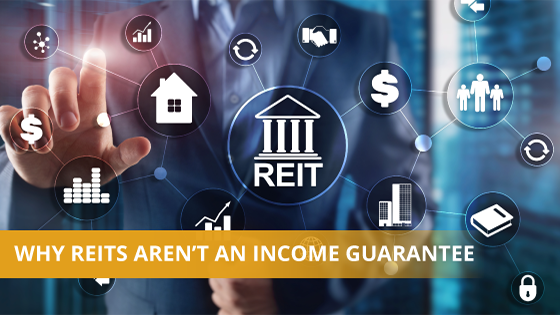Real estate investment trusts, or REITs, enable individuals to invest in real estate projects that pay at least 90% of their taxable income out as a dividend. While real estate is a relatively safe source of income, the COVID-19 pandemic made it painfully clear that it’s no guarantee and diversification is critical for ensuring a steady source of income in retirement.
Let’s take a closer look at REITs, how COVID-19 is impacting them and how investors can diversify their income beyond just real estate.
What Are REITs?
Real estate investment trusts (REITs) are companies that own, operate or finance income-generating real estate. By pooling capital from multiple investors, they enable individuals to invest in real estate without having to buy, manage or finance properties on their own. Many REITs trade on stock exchanges, making them easy for investors to buy and sell.
REITs must meet several requirements, including:
- Investing at least 75% of their total assets in real estate, cash or Treasuries.
- Deriving at least 75% of gross income from rents, mortgage interest or real estate sales.
- Paying a minimum of 90% of taxable income in the form of dividends each year.
There are many different types of REITs. For instance, REITs may invest in commercial or residential real estate, or generate income from rents or mortgage interest. The stability of REIT income depends a lot on the types of properties that they own and the way that they generate income from those properties, among a range of other factors.
REIT vs. Other Returns – Source: Nareit / SeekingAlpha
On the whole, REITs provide a steady source of income and attractive capital gains. Nareit found that equity REITs had a 12.55% annual return between November 1998 and 2018 compared to just 7.73% for the S&P 500 index, although that doesn’t mean that the future will be just as bright or that there aren’t important risks to remember.
COVID’s Impact on REITs
The COVID-19 pandemic has taken a toll on real estate around the world. While residential home prices are on the rise, malls, office space and strip shopping centers have seen falling rents, occupancies and prices due to COVID-19-driven lockdowns. The good news is that most REITs are fairly well capitalized and able to weather the downturn—at least for now.
The FTSE Nareit All Equity REIT Index fell about 6% between January and December 2020, including dividends, compared to a positive 14% return for the S&P 500 index. Shopping center REITs fell by more than a quarter and regional mall REITs fell more than a third although self-storage REITs rose about eight percent and industrial REITs rose nearly 10 percent.
A COVID-19 vaccine may be on the way for most of the developed world by mid-summer of 2021, but the pandemic could have a long-lasting effect on consumer behaviors. For example, travel may still be sluggish through most of 2021 and into 2022, while many office buildings and restaurants may struggle to find tenants given a change in consumer behavior.
Other Risks to Remember
The COVID-19 pandemic may have punctuated the risks associated with REITs, but pandemic-related issues aren’t the only risks to keep in mind. For example, interest rates have been falling and housing prices have been rising for a long time, but a reversal in these trends due to the economy or policymakers could have a significant impact on the market.
REITs also tend to be highly vulnerable to any recession. When economic activity drops, commercial REITs often experience a drop in rents and occupancy rates. Highly leveraged REITs may also have trouble refinancing debt or even making payments on existing debts. In some cases, the lack of financing and revenue can force them to liquidate assets at bargain prices.
Different types of REITs also have different risks to keep in mind. For example, single family home REITs are much more susceptible to mortgage interest rates and other housing market dynamics whereas shopping mall REITs may be in secular decline. Each REIT has its own structure, strategy, properties, management and balance sheet characteristics.
Alternatives to Consider
Investors that want to diversify their income in retirement may want to add other income-producing strategies to their portfolio.
The most popular ways to generate income is through fixed income investments, such as bonds, and dividend-paying stocks. With record low interest rates, many investors are hesitant to go all-in on fixed income investments. Dividend stocks offer upside potential in addition to income, which makes them an attractive way to diversify income.
Those looking to generate more income from equities than just dividends may want to consider covered call options. By writing covered calls, you can maintain a portfolio of high-quality stocks and generate a higher income than fixed income investments and dividend stocks. You can also avoid the need to drawdown your equity portfolio during retirement.
Take our free e-course to learn more or explore our asset management options.
Of course, the key to success is maintaining a diversified portfolio that insulates underperformance in any one area from affecting the entire portfolio. A real estate downturn, for example, may not impact bonds in the same way and vice versa. By being cognizant of these risks, investors can maximize their risk-adjusted returns over time.
The Bottom Line
Real estate investment trusts, or REITs, enable individual investors to participate in the real estate market. While they provide a great source of income and capital appreciation in most economic environments, the COVID-19 pandemic underscores the need for diversification—especially for retirees that rely on a regular income.
Fixed income and dividend stocks are two of the most popular ways to generate income, but investors may also want to consider covered call options. By writing covered calls, you can generate more income than dividends alone without the need to draw down your equity portfolio during retirement. Contact us to learn more.







